Which grammar is important to speak English: In this article, we’re going to talk about grammar. I know it is your favorite topic, and this is why we’re going to start with prepositions. Then, we’re going to talk about some basic grammar rules, and of course, we’re going to talk about articles. Is it ‘ah’ or is it ‘the’? In the end of this article, we will discuss tenses in English. So, if you’re learning English, this article is for you. Let’s start.
Which grammar is important to speak English
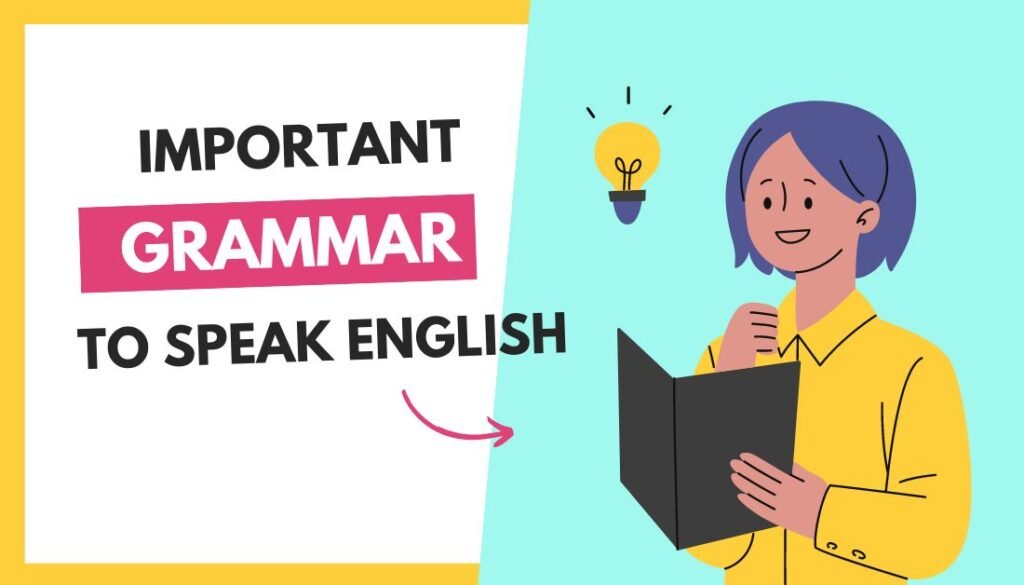
Learning grammar is a must to learn any language because it helps one communicate clearly and effectively with others in any situation. Learning grammar is also a requirement because it is the main feature within both our spoken and written communication. Grammar is a vast subject but if you know the basic English grammar rules, then it can help you a lot as a beginner. If you know when to use correct prepositions, articles, and basic structure then you are on the right path of learning the English language. Studying basic grammar rules can make you perfect at learning the English language. The following points we will cover in this article:
- How To Use Correct Prepositions?
- Basic Grammar: Parts of Speech
- Basic English Grammar: Tenses
- What is Word Oder in a Sentence
- How to use Articles in English
- Marker Words for Tenses in English
How to Use Correct Prepositions?
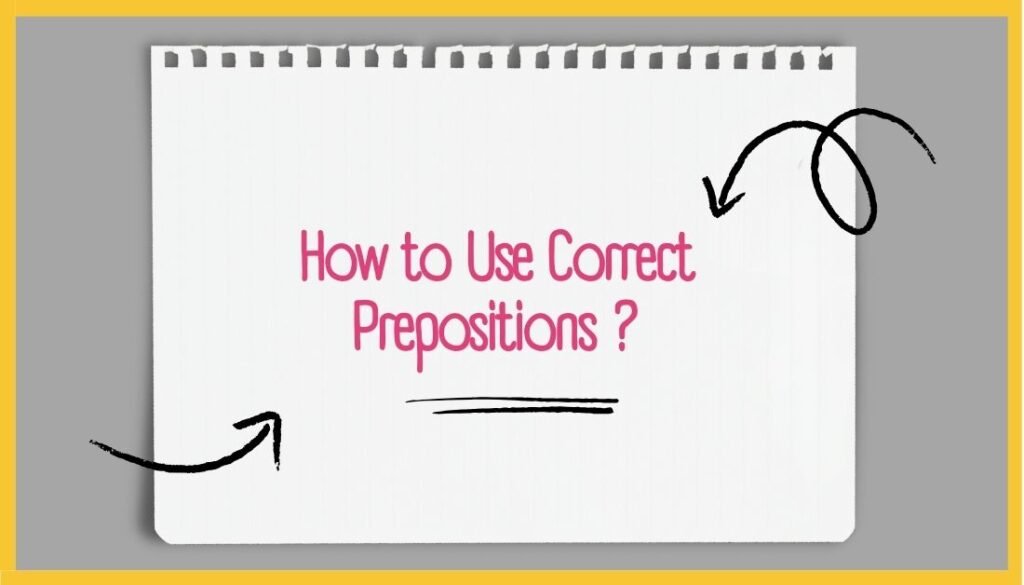
People get confused with prepositions:
- On the hotel on in the hotel
- On the bus or in the bus
These prepositions are very confusing.
But first of all, whichever preposition you decide to use, native speakers are going to understand you. No one’s going to tell you, ‘No, no, this is the wrong preposition.’ Like if you’re talking to native speakers, normally no one would tell you that something is wrong. But if you’re taking a test, yes, this is where problems might start because this is where you will get lower points if you make mistakes. So, let’s start with prepositions in English.
1. ‘at’ vs ‘in’
Let’s start with ‘at’ vs ‘in’.
Preposition rule for ‘In’: The rule that you have to remember: ‘in’ is used with major, big things like countries, cities, and continents.
- I was born in Europe.
- He was born in Italy.
- He was born in Rome.
- I was born in Liverpool.
Preposition rule for At: We use ‘at’ with smaller, insignificant kinds of places:
- I’m at the farmer’s market’ because Farmer’s Market is relatively small. Same with buildings.
- I’m at the airport
- I’m gonna meet you at the restaurant.
With small, insignificant things, we’re using ‘at’.
2. All vs. All of
The next set of rules is regarding ‘all’ vs ‘all of’.
Preposition rule for ‘All of’: So, we use ‘all of’ when we have pronouns. Pronouns are us, they, them, me, you. Those are all pronouns. For example,
- All of us are going to Malibu next week.
- All of them have completed their TOEFL test.
So, whenever it’s a pronoun, we have ‘all of’. [which grammar is important to speak English]
Preposition rule for ‘All’: However, in all other cases, we have ‘all’. ‘
- All the people are forced to stay at home.
- All the students have to wear masks.
- All the children need to stay at home.
3. In vs. On vs. At. (Prepositions of time)
The next section: ‘In vs. On vs. At’ when we’re talking about time.
When to use ‘in’ preposition in the sentence: ‘In’ is used with general measurements. So, when we talk about general measurements like:
- I’ll be there in two minutes.
- I’ll see you in two days.’
- We’re gonna travel abroad in two months.
And remember that ‘in’ is also used with a year.
- I was born in 1990.
- He will come back in 2025.
- That was in 1994.
When to use ‘on’ and ‘at’ prepositions in the sentence: However, when we have a specific date and time, we use ‘on’ and ‘at’.
- I will see you on Monday at noon.
- The classes start on September 21st.
- We’ll see you on Friday.
4. Beside vs. Besides
When to use the ‘beside’ preposition in the sentence: Beside is a preposition that means nearby.
- We were camping beside the river.
- We were camping on the shore (We’re close to the river and we’re camping there)
When to use the ‘besides’ preposition in the sentence: Besides’ as an adverb and a preposition that means in addition to.
- Besides, we need your support in this venture. (So, this is something you would start your sentence with).
- ‘Besides two suitcases, I’m taking three boxes with me. (it means in addition to my boxes, I’m taking my suitcases).
5. Among vs. Between
When to use the ‘among’ preposition in the sentence: ‘Among’ is used when you have a group of objects or people, usually three or more.
- She is very popular among her classmates.
- I can choose among all your T-shirts.
When to use the ‘between’ preposition in the sentence: Between’ is when you have two objects.
- I can’t decide between going to the cinema and staying at home.
6. Two vs. Then
When to use ‘to’ preposition in the sentence:: There are several words that can only be followed by ‘to’ and these words are: senior, junior, prefer. prior, superior, inferior. preferable
- He is senior to me in service.
- I prefer coffee to tea.
- I like coffee more.
- He is superior to me in terms of grades. (Which means he’s higher than me). So, with these, we use ‘to’.
When to use the ‘then’ preposition in the sentence: In other cases, we use ‘then’.
- He’s better than me
- She’s more beautiful than me’, etc.
- You’re no better than he is.
7. In vs. Into
When to use the ‘in’ preposition in the sentence: We use ‘in’ when we have a person, an animal, or an object located in a location. [which grammar is important to speak English]
- I was sitting in the classroom.
- He was in the house when the policeman came.
When to use the ‘into’ preposition in the sentence: We use ‘into’ in the sense of coming toward something.
- He came into my office. (he was kind of entering a closed space and he was moving toward me. ‘So, he came into my office).
- We’re driving into the garage.( this is this movement inside).
8. Since vs. For
When to use ‘for’ and ‘since’ prepositions in the sentence: ‘For’ measures a period. ‘Since’ marks the start date.
- I’ve been vlogging for five years already.
- I’ve been vlogging since 2014.
9. Agree with vs. Agree to
Agree with versus agree to.
When to use the ‘agree with’ preposition in the sentence: ‘Agree with’ is used for agreement with a person.
- I agree with you.’ ‘We need to practice English daily.
- I agree with our president that we need to support our economy.
- I agree with Dinesh.
When to use the ‘agree to’ preposition in the sentence: ‘Agree to’ is used for agreement to a plan, proposal, or idea.
- I agree to your proposal.’ ‘Let’s start a company together.
- I agree to your idea.
10. To vs. For
When to use ‘to’ preposition in the sentence: The first thing that we’re gonna do, we’re going to talk about when we use ‘to’. The first case when we use ‘to’ is when talking about a destination. [which grammar is important to speak English]
- I am going to Germany at the end of April.
- We are going to a restaurant tonight. (Because this is a direction.)
There is a second case of using ‘to’ compare time’. For example:
- I prefer traveling to sitting at home.
- I prefer sleeping to working.
- I prefer metaphysics to theology.
There is a third case of using ‘to‘ receiver of action’. The next type of use is when we’re talking about a receiver of an action.
- I gave my book to my followers.
- I sent a letter to my friend.
- I wrote an email to my colleague.
- Can you give it to me?
There is a 4th case of using ‘to‘ to express reasons’: and last but not least, when you want to express a reason for your action. For example:
- I came here to see you.
- I did it to make more money.
- I’ve started learning English to get a job promotion.
So, we’re explaining why we’ve started doing something, and this is when we use ”to’.
When to use the ‘to’ preposition in the sentence: Now, when we talk about benefits, we use ‘for’. So, for example: you’re doing something for your health or for the benefit of being a parent.
- I bought a gift for my friend.
- I stopped eating gluten for the benefit of my health.
- I’ve been learning English for several months now.
There is a second case of using ‘for’ to talk about a period of time: It indicates a period of time. For example:
- I have been living in the US for 4 years
- I have been learning English for several months now
There is a third case of using ‘for’ to talk about the schedule: Also when we talk about schedule, we use ”for’.
- I made an appointment with my doctor for March 13th.
- Your flight is scheduled for May 31st.
There is a fourth case of using ‘for’ to express reasons: We also use four to express a reason. [which grammar is important to speak English]
- He was fired from his job for being constantly late. (He has been late so many times, and he’s been fired for that).
- She’s been promoted for her good English because her English reached a certain level and she qualified for a promotion.
There is a fifth case of using ‘for’ for the purpose of something: we also use four to express a purpose of something.
- She is saving money for buying a new mobile phone.
When to use ‘to and for’ in the sentence together: There are also cases when ‘to’ and ‘for’ can be both used. Let’s talk about some examples so I can illustrate this better. Let’s compare two examples:
- He’s studying English for work. (the reason is a noun)
- He is studying English to be able to talk to his American friends. (the reason is a verb).
So, what we’ll notice here is that we use ‘for’ with a noun. He learns English for fun. He learns English for work. But when we have a verb, we say to. He learns English to talk to his friends in the U.S. See the difference?
Now let’s move on to another example when both two and four can be used.
- My friend brought lunch to me. (direction).
- My friend brought lunch for me (act of kindness).
Now both are correct, but they have slightly different meanings. My friend brought lunch to me. We’re talking about direction. He brought lunch to my apartment, put it on my table, and I started eating. But when we say my friend brought lunch for me, we really want to emphasize that he’s doing something nice for me. He thought about me when he was getting lunch, so he got one for me.
There is a second case of using ‘for‘ and ‘to’ for Apologize for something: Apologize can be used with both two and four because you apologize for something: for something that you’ve done.
- I apologize for breaking your cup.
- I apologize for making you upset.
- I apologize to my friend for forgetting about her birthday.
- I apologize for the language. Apologize to you.
11. Travel to vs. Travel for
We use ‘travel to’ and ‘travel for’ for travel to somewhere.
- I travel to Russia.
- I traveled to Paris.
- I traveled to Germany.
- I travel to Russia for an event. (but I travel for work).
- I traveled to Germany for meetings.
You see, so four sentences are for the reason, and two are for the destination.
12. Wait for vs. Wait to
Wait for all, wait two, wait for someone or something.
When to use ‘wait for’ in the sentence: You use ‘wait for’ for someone or something.
- I’m waiting for the concert tonight.
- I am waiting for my dad to come and visit us in California.
When to use ‘wait to’ in the sentence: We use ‘wait to’ do something. For example:
- I cannot wait to see my family in Russia.
- I cannot wait to travel this summer
- I cannot wait to show you this.
13. Ask for (something)
When we use ‘ask for’: we normally use it to ask for something.
- Can I ask you for a cup of tea, please?
- Can I ask you for a favor?
- Don’t ask for permission, ask for forgiveness.
14. Belong to (someone)
When we talk about belonging, we normally say to:
- It belongs to me.
- It belongs to you.
Never belongs for.
15. Care for (someone)
When we say care, we care for somebody.
- I care for my dog.
- I care for Alex.
- I care for my family.
- You care for him.
16. Prepare for (something)
When we’re saying prepare, we always say prepare for something. [which grammar is important to speak English]
- I will need to prepare for the festival.
Basic Grammar: Parts of Speech
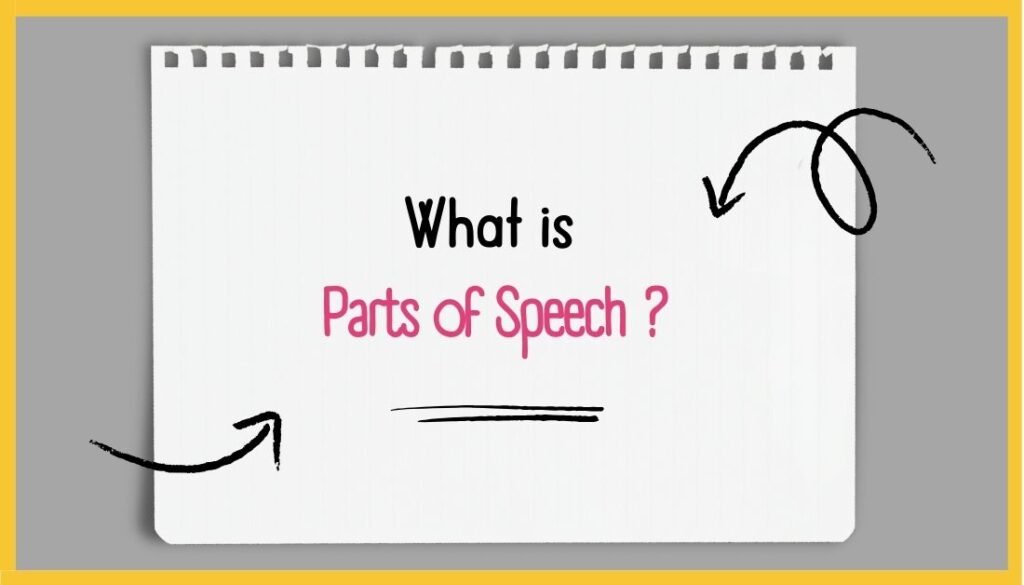
There are eight types of pasts of speech in the English language: noun, pronoun, verb, adjective, adverb, preposition, conjunction, and articles. Understanding the parts of speech is important to learn the English language. because it will help you determine how words function in the sentences. We will discuss these one by one. Let’s talk about parts of speech.
1. What is a noun?
These are our objects or subjects: cat, dog, mom, table. These are all nouns. When a word names a person, place, thing, or animal in a sentence that is called a noun. Nouns are categorized into five types: common nouns proper nouns, collective nouns, abstract nouns, and material nouns.
2. What is a pronoun?
A pronoun is a word used to replace a noun. These are words that substitute a noun to avoid repetition: I, you, he, she, it, they, we, etc.
3. What is a Verb?
We use verbs to express actions: go, read, eat. So when a word describes an action, occurance that is called a verb in grammar. For example, I will go to the store, He is writing a book, and Maria sings a song.
4. What are adjectives?
Adjectives I used to describe nouns, because we’re going to talk about adverbs later, and those are used to describe actions or adjectives. This is where it gets a bit complicated, but I really want you to understand the difference between adjectives and adverbs, because sometimes you use them in the wrong way, and I use them in the wrong way sometimes, but we want to be grammatically correct. [which grammar is important to speak English]
So, an adjective is used to describe nouns or pronouns. We use adjectives to answer questions like: which one, what kind of, how many, how much, etc.
5. What is an adverb?
Adverbs describe actions. Adverbs answer questions like when, where, and how, and very often adverbs end with ‘ly‘. For example: fully, slowly.
But not always, ‘fast’ is also an adverb. Finally, now ‘fast’ can be both an adjective and an adverb. If we look at a couple of examples: ‘He is fast’, we use ‘fast’ to describe a pronoun, then it’s an adjective. But if we say ‘He runs really fast’, we’re actually describing a verb and in this case, it’s an adverb.
6. What is Preposition?
Then we have our prepositions, we place a preposition before a noun to modify the phrase about, above, across, on, etc.
7. What is Conjunctions?
This is a joining word that we use to connect sentences or different parts of one sentence. But, and, however, after, although, etc.
8. What is the article in the English language?
The last but not the least, articles ‘a’ and ‘the’. ‘A’ or ‘an’ and ‘the’.
We use ‘a’ or ‘an’ to mention a thing that we haven’t talked about before. There is a mug on my desk. But if I’m talking about one particular mug that I’ve already mentioned in the conversation, I would say: ‘There is black tea in the mug.’ In the mug that I mentioned before. For the mentioned things, we use ‘the’. [which grammar is important to speak English]
Basic English Grammar: Tenses
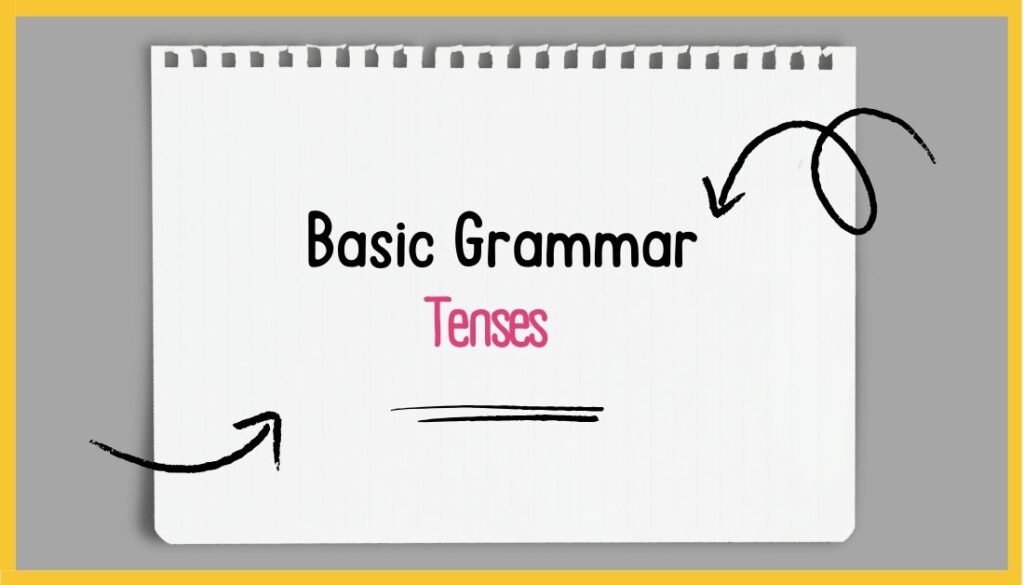
Now, let’s talk about basic tenses. We’re going to talk about three tenses: present, past, and future. Some people would argue these three tenses are enough to speak English. They are kind of enough, but of course, native speakers use all the tenses. That doesn’t mean they understand the construction because they learn everything as kids. But I’m gonna explain the basic structure to you because you know we’re not native speakers and we don’t have this advantage.
Present Simple Tense
Now, the present simple tense is used:
- to describe habits. ‘I drink coffee every morning.
- to talk about schedules, ‘The train leaves at 5 pm.
- to talk about general truths, ‘Ice is cold.’
One thing to remember is that in English there should always be a noun, and a pronoun in a sentence, and there always should be a verb. So for example:
- if we say, ‘I drink coffee every morning,’ then the action is ‘drink’.
- sometimes we don’t have actions, sometimes we just describe something and in this case, ‘ice is cold’, a verb is ‘is’.
Past Simple Tense
We use past tense to describe something that happened in the past. So basically:
- your verb gets either ‘ed’ on the end. ‘I walked.’
- Or if it’s an irregular verb then you just have to learn it. ‘She went home.’ ‘He drank a glass of beer.’
Future Simple Tense
The future tense is, of course, used to describe our future. In this case, we just put ‘will’ before a verb. Fro example: she will come back. [which grammar is important to speak English]
What is Word Oder in a Sentence
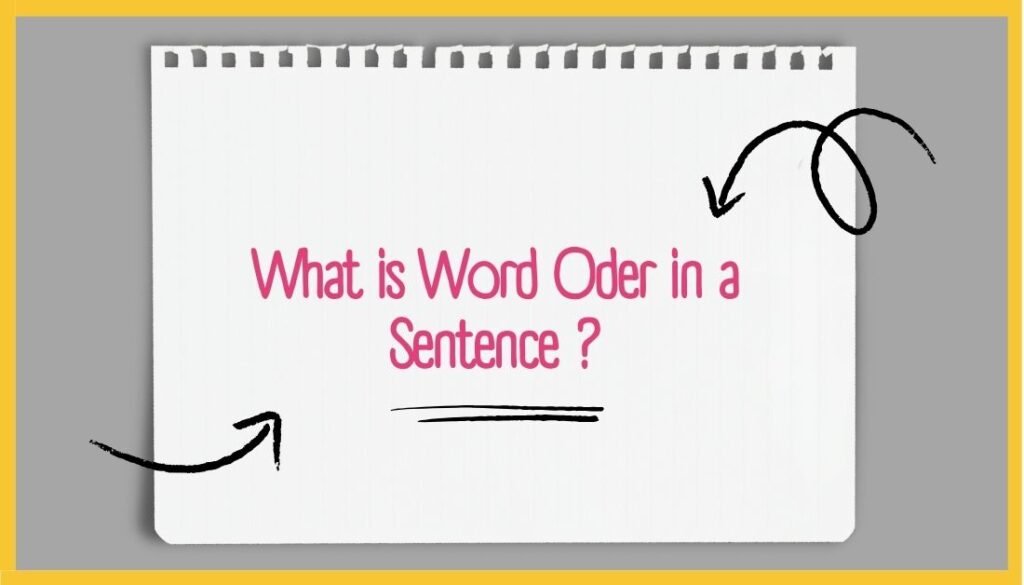
Let’s talk about word order in a sentence. In English,
- first of all, we have a subject, which is a noun or pronoun.
- Then we have a verb or action.
- And then if we need it, we have an object, which is normally a noun or pronoun as well.
So let me give you a quick example. She (noun) smiled (action/verb) at a boy (object/ noun pronoun).
And then if we need to describe our action with an adverb, remember, adverbs describe verbs, we put it right before the verb. For example, She (noun) briefly (adverb) smiled (action/verb) at a boy (object/ noun pronoun).
Then if we have adjectives that describe a noun, then they come right before the noun. ‘She smiled at a little boy.’ She (noun) smiled (action/verb) at a little boy (object/ adjective/noun pronoun).
Of course, this rule is very basic, the more you learn, the better you become.
There is one last thing I wanted to tell you: don’t make this mistake. Let’s look at these three sentences:
- They often play tennis. (Correct)
- They play tennis often. (Also correct)
- They play often tennis. (This is incorrect) Because an adverb can never be put between a verb and an object. So this is wrong, just remember because this sounds a little weird.
Students Also Read: How to be GOOD in English Grammar: 4 Steps
How to use Articles in English
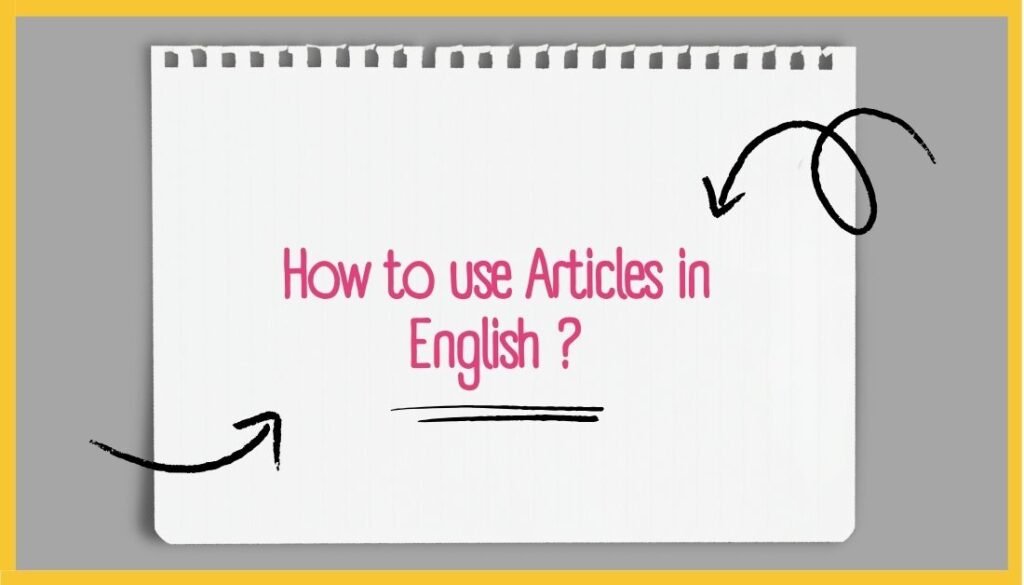
Do not forget about articles when you speak English. Let’s talk about them, when and how you use them.
There are two articles ‘a/an’ and ‘the’:
- We use ‘a/an‘ when we talk about objects that we encounter for the first time in our speech/conversation.
- We use ‘the‘ when we mean something specific.
1. First rule of using Articles in English: A/The
Something specific is always ‘the’. For example, ‘Maria, where did you get the dress that you wore yesterday?’ This is a very specific dress, I only have one dress, and I’m pretty sure she means the dress that I was wearing yesterday. And that was the specific white dress, whatever. So this is a very specific thing.
But if I’m asking somebody, ‘Can you get me a dress when you go shopping?’ I’m not asking for a particular dress, I just need a dress and whatever dress you can find that suits me, just get it.
So, see the differences? In the first example, with the specific dress I wore yesterday, I meant that dress that I wore yesterday. But when I’m asking to buy a random dress, this is ‘a’ dress. [which grammar is important to speak English]
2. Second rule of using Articles in English: An
If a word starts with a vowel, ‘a’, ‘e’, ‘o’, ‘u’ ‘I’, We replace ‘a’ with ‘an’. ‘ an Apple’, ‘an eggplant’, ‘an elephant’.
3. Third rule of using Articles in English: General rule
Another general rule is when you talk about something for the first time, you say ‘a’. When you mention it in your conversation for the second time, you use ‘the’.
For example, ‘Yesterday, I went to a party.’ I mentioned it for the first time. But in the second sentence, I would say, ‘The party was amazing.’ Because I’ve already stated that I will be talking about a specific party, and in the second sentence, I’m referring to that specific party, so it’s ‘the party’.
Another example: ‘Yesterday, I bought an apple.’ You know, just a random apple. That apple turned out to be rotten. So I’m taking it back to the store today. So first, I’m not mentioning a particular apple, I just bought an apple, it doesn’t matter which apple, it doesn’t matter if it’s big, doesn’t matter if it’s small, just an apple. But then when I’m saying that it’s rotten, I already mean that apple that’s in my fridge, so the apple.
4. The fourth rule of using Articles in English: definite article (The)
The definite article is needed when a person or object is unique. If we’re talking about an object that is one of a kind, we always use ‘the’. The moon, the sun, the Black Sea, the Simpsons, so we know that there is only one, one that’s why we always say ‘the moon’, we know that there is one sun, so say that sun. So, whatever it’s something one of a kind, it’s ‘the’.
5. The fifth rule of using Articles in English: Uncountable Nouns
What are uncountable nouns? Porridge, oatmeal, milk, whatever you cannot count because when we’re talking about porridge, you cannot count all the seeds that are there. And when we’re talking about milk, you cannot really count the cells, yes you can measure volume but that’s different, we’re talking about counting, so uncountable nouns means you cannot count them.
So with uncountable nouns, we don’t use any articles, it’s always:
- I like oatmeal
- Can you get me some oatmeal?
- Can you make some porridge for breakfast?
- Can I have some milk? (The only way you would be able to count milk is by adding glasses, so ‘Can you give me a glass of milk?’ )
6. The sixth rule of using Articles in English: Countable Plural Nouns
Don’t use articles for countable plural nouns. When we have plural countable nouns: bicycles, computers, cameras, bloggers, so whenever these words appear in a sentence, we do not use any articles. For example, ‘I have three computers at home., I like watching vloggers, I love bicycles. [which grammar is important to speak English]
7. The seventh rule of using Articles in English: Abstract nouns
There’s a quite similar rule for abstract nouns and when you’re talking about something in general, you don’t need an article. No articles are needed in general terms.
For example, ‘information on the internet is very useful.’ So information is this abstract noun, you don’t mean any specific information, you just mean that information that is available to everyone on the internet is very useful.
But again, just to compare, when you use particular information that you receive, ‘The information that I’ve read on Wikipedia regarding YouTube is super useful.’ Then you need to insert ‘the’, the definite article, because you mean some specific information. But when you’re talking about information in general, you don’t use articles at all.
8. The eighth rule of using Articles in English: Proper Nouns
A proper noun is a noun that indicates a place, person, or thing with a specific name. In the case of articles, we never use articles with proper nouns: Tuesday, Monday, New York. You can distinguish those proper nouns by the capital letter that they start with.
But of course, there are exclusions to this rule. If a country’s name consists of several words, such as ‘the United Kingdom’, because that refers to the kingdom here, so ‘the United Kingdom’, ‘the United States of America’. So whenever the name consists of several nouns, you use ‘the’. Moreover, If countries have plural nouns as their names, like the Philippines, and the Netherlands, then you must use ‘the’ while addressing. [which grammar is important to speak English]
9. The ninth rule of using Articles: Talking about meals
The last but not the least, when you’re talking about meals, don’t use articles.
- I’ve already had lunch today.
- I’ve already had breakfast.
- Let’s head out to dinner.
‘But again, we’re just talking about non-specific meals, just stating that we had a meal. But if you want to say that you are sick from the dinner you had yesterday, then you need a definite article because you mean that specific dinner. It would probably be something in the past. You use ‘the’.
Why using articles are so confusing?
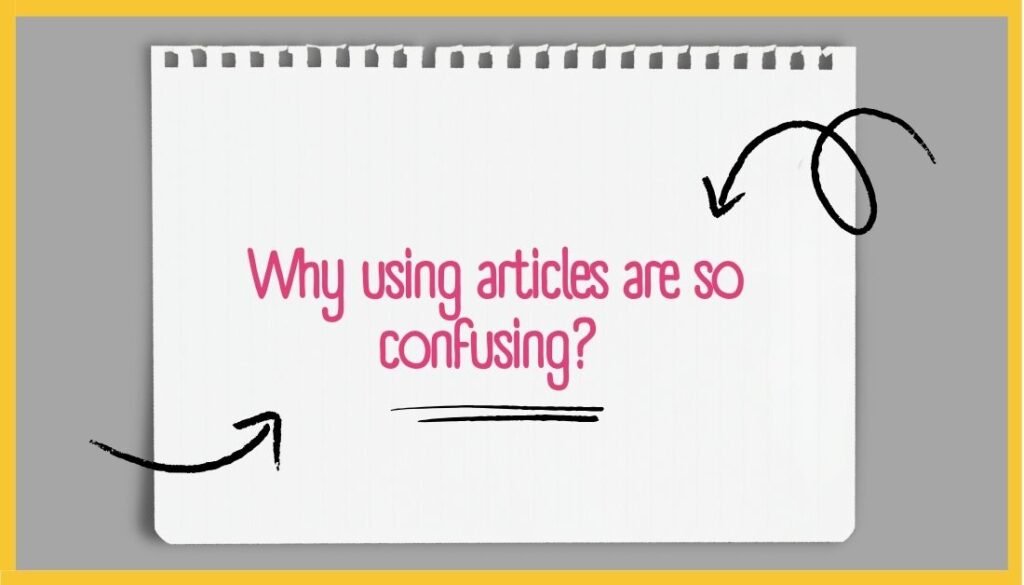
But, why articles are so confusing? Because there are always, always, exclusions.
You can add ‘the’ to uncountable nows when you refer to something specific: For example, there is a store in your house that sells specific milk, and you want to highlight that you like the milk from that store because it’s one of a kind, you really mean that milk and you cannot get it anywhere else, then you can say, Oh my God, I love the milk from that store. Because you’re being specific. And again, I just mentioned that with milk, we don’t use any ‘the’, but we don’t use any ‘the’ or ‘a’ when we don’t mention specific milk, we just mention milk as food.
You can also add ‘the’ to countable in the plural form if you specify them: If that shop also sells apples that you love, you can say, ‘Oh, I love the apples from that store, And people realize that you mean specific apples that are only sold there, and they’re one of a kind.
Marker Words for Tenses in English
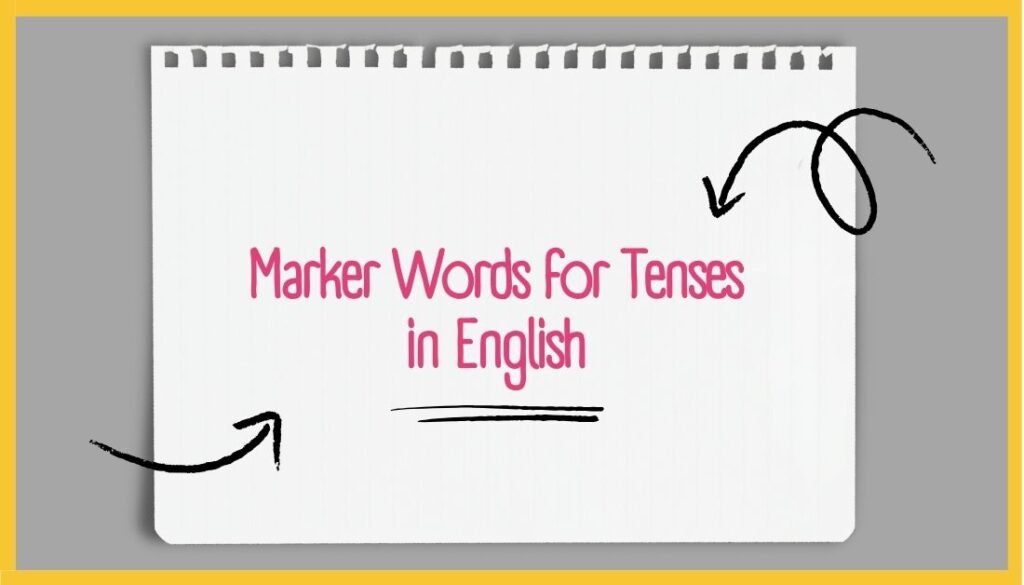
Now, let’s move on to another topic that is kind of endless in English, and the topic is tenses. Today, I’m going to teach you which terms to use when you see certain words in the sentence. We call them marker words, so sometimes you see them, and you’re like, “Oh when people use this word, they would typically use this particular tense. [which grammar is important to speak English]
1. Present Simple Tense
Let’s start with the simplest tense ever: present simple. Present simple is a tense that is used for regular actions, something that happens to you every day, every night, every month. So something that you do regularly, and also for some things that are pre-scheduled, like “The airplane arrives at 5 PM.
The marker words for Present simple tense are:
- Usually
- Every day (day, week, etc.)
- Often
- Seldom/rarely (“rarely” is more American. For actions that don’t happen too often)
- Always
- Never
- As a rule
- Hardly ever( is like very, very rarely).
- Today
- From time to time
2. Simple Past Tense
The next tense is also simple: past simple. This is the tense that we use to describe actions in the past. And it doesn’t really matter what kind of result we have right now, because that’s present perfect. For past simple, think of it as telling a story about something that happened to you last year, in 1994. So you’re just describing the series of actions or just one action or something that you were doing back then.
So just think of it this way: you are describing something that happened to you, something you did a year ago, two years ago, etc.
The marker words for Past simple tense are:
- Yesterday
- the day before yesterday
- Last (week, month, year. etc).
- A (week, month, year, etc.) ago
- The other day
- in 1994 (specific year)
- Once
- When ( you would insert something in the past)
- That day
3. Future Simple Tense
The future simple is when you’re not 100% sure about something. For example, you have an appointment with your friend, and he says, “I will come in an hour.” So that means he’s 90% sure that he will come in an hour. Maybe he won’t come because he can’t control other people. But if you have an airplane that leaves at 5 PM, you see, I’m already using present simple. So when it’s something that you’re 100% sure of, it’s present simple.
It’s like for timetables, opening schedules, and stuff. “The store opens at 9 AM.” “The store closes at 9 PM.” That’s all present simple. But when we’re talking about actions we’re not sure about, like 90% sure, but we’re still kind of guessing, that’s future simple. [which grammar is important to speak English]
The marker words for Future simple tense are:
- Tomorrow
- The day after tomorrow
- Next (week, month, year, etc.)
- In an (hour, second, minute, etc.)
- In the 22nd century
- Soon
- Later
- Some day
- In a day/in a week/in five years
- In the future
- One of these days
4. Present Progressive (Continuous) Tense
The Present Progressive (Continuous) tense is used to describe something that is happening right now.
The marker words for the Present Progressive (Continuous) tense are:
- Now
- Right now
- At the moment
- Today
- Look/Listen! (if you’re trying to pay somebody’s attention)
- Still
- Currently
- At this very moment
- these days/this week(month, year)
- Constantly
5. Present Perfect Tense
Last but not least, we’re going to talk about the present perfect. People mix it with past simple very often. So present perfect focuses on the present. It focuses on the result you have right now.
The present perfect is a present tense. It focuses on the result that you have right now. It does not focus on the details of a past action because, for that, we have past simple tense. For results right now, we have present perfect.
For example, “I have eaten.” This means that you’re not hungry. If you’re kind of translating, explaining, if you say, “I ate pizza yesterday for lunch,” that means you’re telling a story about what happened yesterday. You’re not really focusing on something that you have right now. This is a way for you to determine which tense to use.
The marker words for the Present Perfect tense are:
- Ever
- Never
- Just
- Already
- Yet
- Recently
- Lately
- Before
- Always
- So far
- At last
- It’s the first time
- All my life
- All morning
Conclusion
In this article, you learn the basic rules of English grammar. Many people make mistakes while using prepositions, and articles. [which grammar is important to speak English] Moreover, understanding simple tenses is a must if you are a beginner. In this article, I have explained very well what parts of speech in the English language, and the role of part of speech in a sentence. if you understand the concepts, if you learn them, there is a 99 percent chance that you will be able to speak English at a level where you can explain what you need, explain what you’re doing for life, or even work with people,
If you found this article was well explained plz rate this article or if you have questions, you can ask me in the comment section below.
Students Also Read: C1 Grammar: Quick Questions and Answers